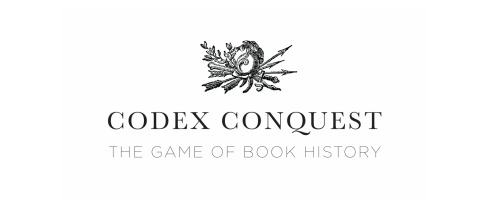
Codex Conquest

Get the Game
Download: ![]() Cards
Cards
Download: ![]() Rules
Rules
Learn More
View: Website
Video: Set Up & Rules
Video: Interview with a Rare Book Curator
Podcast: Interview with Amy Chen, game designer on Talk of Iowa
Frequently Asked Questions (FAQ)
What is Codex Conquest?
Codex Conquest is a open educational resource (OER) card game comprised of three decks of cards: books, history, and chance. Codex Conquest teaches students to recognize the most important printed books of Western civilization by their nation, century, genre, and current monetary value. Along the way, students learn world history and the scenarios that influence the shape of collections at institutions. Suiting a variety of curricular objectives and student levels, the game can be tailored to fit subject and time specifications and is accessible to students from high school through graduate school. How deeply students engage with the content of Codex Conquest depends on your pedagogy.
How much does Codex Conquest cost?
As an open educational resource, Codex Conquest can be downloaded and used for free in your classroom. The only associated cost of the game is if you elect to have it printed locally on cardstock. You can choose print it off on a regular color printer and then glue stick the front and back of each card together to make the deck, but this is not recommended as there are 220 cards in the game total: 100 books, 100 history, and 20 chance.
How was Codex Conquest's logo created?
Heidi Wiren Bartlett cut the image from Domenico Angelo’s The School of Fencing: With a General Explanation of the Principal Attitudes and Positions Peculiar to the Art (1787).
Can I create a country booster pack for Codex Conquest?
Yes! We would love to have you make a booster pack to expand the geographical range of Codex Conquest. To make this personalization easier, the cards are on PowerPoint while the rules are in Word.
First decide if you want to follow the anachronistic precedent of the game. If you choose to label territories by their current national affiliations, you will need 4 book cards and 4 history cards for each of the 5 centuries (15-19), for a total of 20 book cards and 20 history cards, or 40 cards overall. An example of this is if you wanted to include Swedish printing into Codex Conquest, which would require that you only use books printed in cities currently between Swedish borders, not those under Swedish rule at one time or another. If you choose to represent a territory only in the period in which it functions independently (like, say, Sardinia before it was unified into Italy), then you will need to create 4 book cards and 4 history cards for each century in which that territory is independent.
Then download the game's PowerPoint file and replace the content as directed by your needs. When you are done, send the file to amy-chen [at] uiowa.edu, who will review your submission and then place it on this page with full attribution.
Who designed Codex Conquest?
The following people contributed to Codex Conquest's research and development:
- Game Designer: Amy Hildreth Chen
- Digital Project Manager: Hannah Scates Kettler and Ethan DeGross
- Designer: Heidi Wiren Bartlett
- Accessibility: Edward Raber
- Play Testers: Muzel Chen, Alonso Avila, Lisa Gardinier, Margaret Gamm, Lindsay Moen, Jennifer Masada, John Fifield, Katie Hassman, Erica Knapp, Allie Paarsmith, Keri Lawson, Caroline Hogan, Beth Yale, Heather Bain, Caroline Barraco, Nichole Cotton, Caroline Hogan, Benjamin Jefferson, Justin Kirkland, Zoe Petersen, Joseph TenHulzen, Eric Voss, Kazumi Wilds, Heidi Wiren Bartlett, Colleen Theisen, Laura Hampton, Kelly Grogg, Hannah Scates Kettler, Matthew Butler, Jayden Bisson, Katherine Bratkiv, Emma Dennis, Zain Khan, Nadav Kohen, Michael Libin, Andrew Mitchell, Daniel Rodriguez-Arzola, Hannah Song, Loghan Sterns, Vivian Wolkoff, Austin Wu, Jiahua Zhang, Pete Balestrieri, Serina Sulentic, Jenny Bradshaw, Stephen Jacobs, Noah Jacobs, David Simkins, Owen Gottlieb, Ian Schreiber, Elizabeth Lawley, Tim Shipe, Melissa Hubbard, Juli McCloone, Becky Wolsk, Megan Lowe, David Calderan, Sarah Florek, Elizabeth Wiegand, Seth Williams, Yougsin Park, Jessica Dulung, Storm Shearer, Khari J. Witmore, Scott LeBeau, Elle May, Katrina Fey, Elolsa Robison, Ryan Knoff, Jared Bradicko, Hailey Boileau, Anna Long, Trevor Kuenn, Bonnie Duong, Josh Bradicko, Sam Nordstrom.
Collaborators
Michelle Chesner
- Norman E. Alexander Librarian of Jewish Studies, Columbia University
- Codex Conquest: Jewish Edition
Serina Sulentic
- Lecturer, Art and Art History, University of Iowa
- Codex Conquest: Graphic Design & Package Design
Development
January-July 2016
- First prototype is a board game
- Second prototype is a card game
- Codex Conquest iteratively revised due to University of Iowa librarian and graduate student feedback
August-October 2016
- University of Iowa Honors First Year Seminar taught using Codex Conquest
- Rochester Institute of Technology tested Codex Conquest
October-December 2016
- Deckbuilder prototype made and discarded
- Revision based on RIT & Honors First Year seminar feedback
January-March 2017
- Serena Sulentic assigns her package design and graphic design classes to create their own versions of Codex Conquest
- First printing
April-June 2017
- Presentation at Iowa Bibliophiles, University of Iowa
- Presentation at Center for Teaching and Learning, Columbia University
- Presentation at Kyle Triplett's Rare Books and Special Collections class, Pratt Institute
- Amy Chen and Michelle Chesner interviewed for the Institute of Play
- Amy Chen interviewed for Rare Book Hub
- Amy Chen interviewed on Talk of Iowa
- Presentation at SHARP at the University of Victoria
- Second printing
- Codex Conquest game loan program begins
- Michelle Chesner launches the website for Codex Conquest: Jewish Edition
December 2017
- Content revision based on presentation feedback
- Design and content revision to facilitate cheaper printing and more accessible design
January-March 2018
- Revision of Codex Conquest's main website completed
- Creation of Human Games (game lab) website